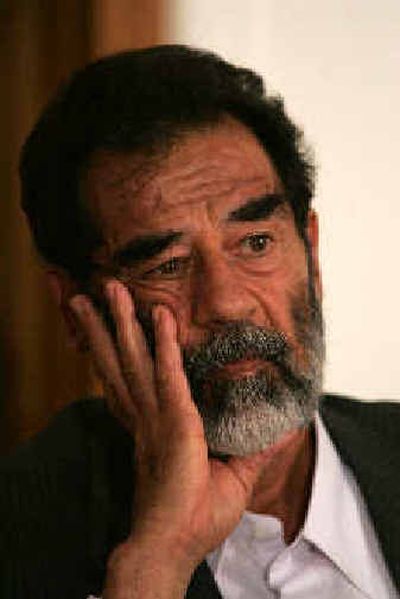Saddam in good health, demoralized’ in prison

LONDON – Saddam Hussein spends his time in solitary confinement tending a garden, writing poetry and reading the Quran, according to published reports Monday that described him as depressed and demoralized.
One of Saddam’s poems is about George Bush, though it wasn’t clear whether that referred to President Bush or his father, Saddam’s foe in the 1991 Gulf War.
The Guardian newspaper in Britain and Newsday in New York quoted Bakhtiar Amin, the human rights minister in the new Iraqi government, who said he visited Saddam’s cell on Saturday. Amin said he did not speak to the former Iraqi leader.
Bakhtiar said Saddam appeared “in good health and being kept in good conditions,” but he “appeared demoralized and dejected,” the Guardian reported.
Saddam’s air-conditioned cell in a U.S. military prison is 10 feet wide and 13 feet long and contained a fold-up bed, a table and a single light bulb, Amin said. Saddam is not allowed to mix with other prisoners, and has no television, newspapers or radio.
“Mostly he reads the Quran today,” Newsday quoted Amin as saying. “He feels more afraid for his life.”
Amin had little to report on Saddam’s poetry. “One of the poems is about George Bush, but I had no time to read it,” Amin said.
He reported that Saddam, 67, was being treated for high blood pressure and a chronic prostate infection, has a hernia and was gaining weight after losing 11 pounds during a time when he resisted all fatty foods.
Doctors have given him antibiotics and have done tests to make sure he has nothing more serious, such as cancer. “To be 100 percent sure he has to do a biopsy,” Newsday quoted Amin as saying. “He refused a biopsy. He didn’t want to.”
Saddam and other detainees get an MRE (meal ready to eat) breakfast, and hot food twice a day, Amin said. Dessert might include oranges, apples, pears or plums, but Saddam also likes American muffins and cookies, Amin said.
Saddam has access to 145 books – mostly travel books and novels – donated by the Red Cross.
Amin said Saddam tends a garden during his daily three-hour exercise period.
“He is looking after a few bushes and shrubs and has even placed a circle of white stones around a small palm tree,” Amin was quoted as saying. “His apparent care for his surroundings is ironic when you think he was responsible for one of the biggest ecocides when he drained the southern marshes.”
Amin, a Kurd from Kirkuk, was reportedly the first member of the new Iraqi government to visit Saddam.
During his visit, Amin said he met Ali Hassan al-Majid, also known as Chemical Ali, who allegedly ordered the use of chemical weapons against Kurds in the late 1980s; Saddam’s half-brother, Barzan al-Tikriti, a former intelligence chief who was Iraq’s ambassador to the United Nations in Geneva until 1998; and Saddam’s personal secretary, Abid Hamid Mahmud al-Tikriti.
Amin said he was approached by Barzan al-Tikriti, who was standing next to Ali Hassan al-Majid.
“Minister, what am I doing here?” Amin quoted al-Tikriti as saying. “I am not like the others, I am not like Ali Hassan al-Majid.” Al-Tikriti asked that the message be passed on to Kurdish leaders and to new Iraqi Prime Minister Iyad Allawi.
“I tried to control my emotions, but to be honest I wanted to vomit,” the Guardian quoted Amin as saying.
“There before me were the men responsible for the industrial pain of Iraq – mass murderers who were responsible for turning Iraq into a land of mass graves.”
Saddam and the other men have not yet been given access to lawyers, Amin said, according to Newsday. Iraqi and U.S. officials said this month that Saddam and the other prisoners to be tried first by Iraqi courts would have access to their lawyers once they were in Iraqi custody. The men are legally in Iraqi custody but are held by coalition forces.